The city was the SAF's last major stronghold in Darfur, and fighting has now escalated in the Kordofan region.
Reuters reported that the RSF has attempted to portray el-Fasher as "back to normal" since its takeover, even as the Yale Humanitan Research Lab published a report earlier this month on the mass killings that the paramilitary group have sought hide evidence of "through burial, burning, and removal of human remains on a mass scale."
Denise Brown, the UN resident and humanitarian coordinator for Sudan, told Reuters that the few people remaining in el-Fasher are living in empty buildings or tents made of plastic sheets. A small market was operating, but was selling only locally grown vegetables.
"The town was not teeming with people," Brown said. "There were very few people that [we] were able to see... We have photos of people, and you can see clearly on their faces the accumulation of fatigue, of stress, of anxiety, of loss."
Healthcare staff were seen at Saudi Hospital in el-Fasher, where 460 people were killed in an RSF attack, but they were working without medical supplies, Brown said.
Yale's report earlier this month relied partially in satellite imagery taken between October 26-November 28, which showed clusters of what researchers said were consistent with human remains in and around el-Fasher. More than 70% of the clusters had become smaller in satellite images by late November, and 38% were no longer visible.
The researchers said the RSF has used particular patterns of killing, including murdering people as they flee attacks, door-to-door and execution-style killings, and mass killings at detention centers and military installations.
Nathaniel Raymond, executive director of the Humanitarian Research Lab, said the UN's discovery of few signs of life in el-Fasher corroborated the lab's findings.
Brown said the UN team is "still very concerned about those who are injured, who we didn’t see, those who may be detained," and told Reuters the officials plan to return to assess water and sanitation access.
About 100,000 people fled el-Fasher in October, and about three-quarters of those forced to leave the city were already internally displaced people who had fled violence as many as three or more times. In total 1.17 million el-Fasher residents have been displaced.
Earlier this month, Doctors Without Borders, also known as Médecins Sans Frontières (MSF), released a short documentary detailing the experiences of people who left the city and are sheltering in Chad.
"They call it Paris, and now it is destroyed," a man named Noor told MSF of el-Fasher. "In the past it was a good city with all its lights on."
An estimated 30.4 Sudanese people are now in need of humanitarian assistance, and on Monday the UN Children's Fund (UNICEF) reported unprecedented levels of child malnutrition in the Um Baru locality in northern Darfur.
More than half of children there are suffering from acute malnutrition, and 1 in 6 are severely, acutely malnourished—a condition that could kill them within weeks if left untreated.
“When severe acute malnutrition reaches this level, time becomes the most critical factor,” said UNICEF Executive Director Catherine Russell. “Children in Um Baru are fighting for their lives and need immediate help. Every day without safe and unhindered access increases the risk of children growing weaker and more death and suffering from causes that are entirely preventable.”
Many of the families observed by UNICEF fled el-Fasher in recent weeks.




